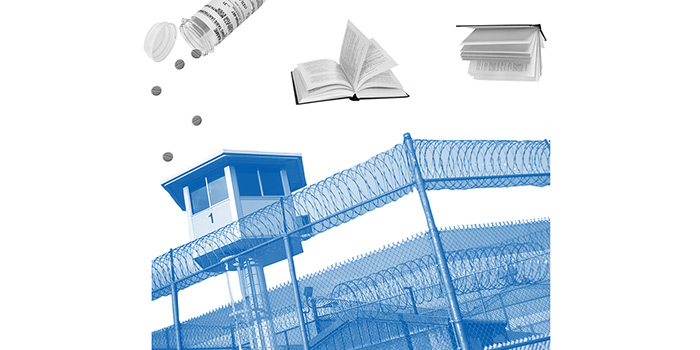Civil Liberties in Prison
The ACLU works in courts, legislatures, and communities to defend and preserve the individual rights and liberties that the Constitution and the laws of the United States guarantee everyone in this country.

The Latest
Explore More
What We're Focused On
-

Access to the Courts and Counsel
The ACLU works in courts, legislatures, and communities to defend and preserve the individual rights and liberties that the Constitution and the laws of the United States guarantee everyone in this country.
-

Free Speech in Prison
The ACLU works in courts, legislatures, and communities to defend and preserve the individual rights and liberties that the Constitution and the laws of the United States guarantee everyone in this country.
-

Religious Freedom in Prison
The ACLU works in courts, legislatures, and communities to defend and preserve the individual rights and liberties that the Constitution and the laws of the United States guarantee everyone in this country.
What's at Stake
The ACLU’s National Prison Project fights to protect the Constitution’s guarantee that individuals who are incarcerated retain basic rights, including the right to free speech, the freedom to practice their religion, and the right to access the courts and counsel.Â
In Turner v. Safley (1987), the U.S. Supreme Court made clear that “[p]rison walls do not form a barrier separating inmates from the protections of the Constitution.” Individuals retain certain fundamental rights, even when incarcerated. The Constitution protects these rights for good reason. Incarceration can have a drastic effect on a person. Oftentimes, a prisoner’s connections to their family or religious community may be their only source of hope. Stripped of these connections, a person will not only endure more difficulties during incarceration, but may also lack the community ties necessary to assist them upon release. Â
Despite the important role that these rights play, correctional officials frequently attempt to restrict them, whether in the form of policies restricting a person’s ability to communicate with family members, limiting access to religious material, or inhibiting a person’s ability to seek relief for abuse suffered while incarcerated.
This is where the ACLU steps in. Prisoners often lack the resources and the opportunity to fight these unconstitutional policies. The ACLU’s National Prison Project works to ensure that prisoners are able to exercise these basic rights.
The ACLU’s National Prison Project fights to protect the Constitution’s guarantee that individuals who are incarcerated retain basic rights, including the right to free speech, the freedom to practice their religion, and the right to access the courts and counsel.Â
In Turner v. Safley (1987), the U.S. Supreme Court made clear that “[p]rison walls do not form a barrier separating inmates from the protections of the Constitution.” Individuals retain certain fundamental rights, even when incarcerated. The Constitution protects these rights for good reason. Incarceration can have a drastic effect on a person. Oftentimes, a prisoner’s connections to their family or religious community may be their only source of hope. Stripped of these connections, a person will not only endure more difficulties during incarceration, but may also lack the community ties necessary to assist them upon release. Â
Despite the important role that these rights play, correctional officials frequently attempt to restrict them, whether in the form of policies restricting a person’s ability to communicate with family members, limiting access to religious material, or inhibiting a person’s ability to seek relief for abuse suffered while incarcerated.
This is where the ACLU steps in. Prisoners often lack the resources and the opportunity to fight these unconstitutional policies. The ACLU’s National Prison Project works to ensure that prisoners are able to exercise these basic rights.





